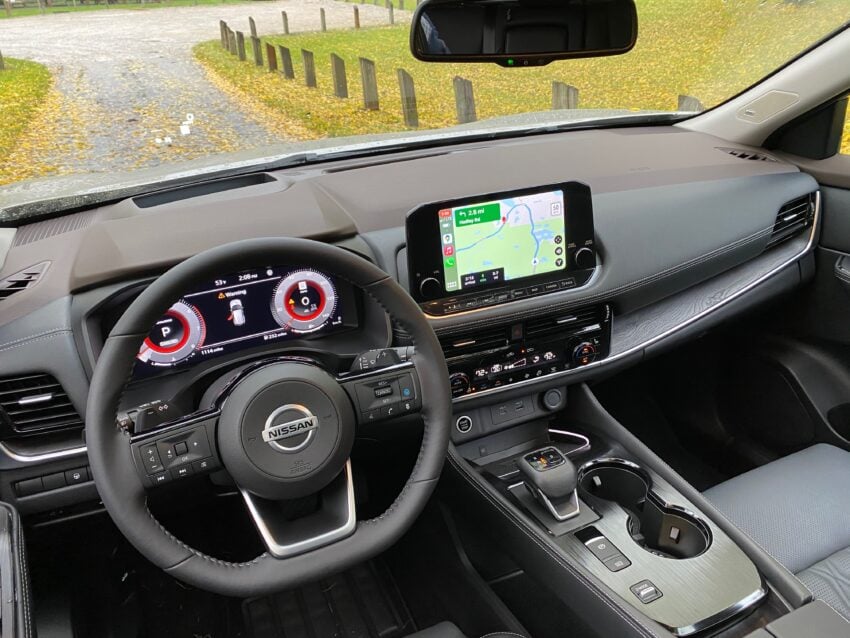Auto
2021 Nissan Rogue First Drive Review: Sensibly Smart & Sexy
We already knew that the 2021 Nissan Rogue looks nice, and packs in a wide range of tech, but how does it drive and how good are the infotainment, Pro Pilot Assist, and other features?
Recently I spent the day driving the 2021 Nissan Rogue Platinum around the middle of Michigan, taking in fall colors as rain threatened and then delivered a slick surface for testing. During my drive, I loved the ability to use wireless Apple CarPlay, a feature you won’t find on many SUVs in this price range and the Bose 10 speaker system in the Platinum Trim proved very good.
My drive route took me across a range of roads, through a lovely downtown and onto the highway where I tested the Pro Pilot Assist before winding through a picturesque stretch of road. The route is just what you would experience on a weekend spent looking for a little local adventure and the only thing I missed out on was finding mid-century modern furniture to fill the back of the Rogue with, but that’s for another adventure. Speaking of cargo space, the Rogue has a small space that’s perfect for a gallon of milk, or a gallon of cider.
The new 2021 Nissan Rogue.
I came away impressed with the driving characteristics of the 2021 Rogue. the driving is predictable and comfortable in all the right ways. As I left the parking lot I ended up throwing some gravel when I underestimated the acceleration available, and then I quickly picked up on the character of the new Rogue. The new powertrain adds in more power and depending on the trim you should see 1-2 miles per gallon of better fuel efficiency.
In addition to the new looks, the 2021 Rogue is on a new platform and chassis, with a new steering system and new suspension. On the road, the stiffer body and new suspension help deliver a smoother overall ride. Even on the wet pavement and on windy roads the Rogue felt under control and very composed. Likely due in part to the new Vehicle Motion Control technology.
The 2021 Rogue is available in front-wheel drive and all-wheel drive, and there is a new drive mode selector that includes auto (normal), eco, sport, off-road, and snow.
On the highway, I activated the ProPilot Assist with Navi-Link, which uses sensors to keep you in the flow of traffic and uses steering assistance to help keep you in your lane as you drive. This isn’t a self-driving mode, but it takes some of the small corrections you make while driving out of the equation. The system performed well, with a very steady control of the wheel. I like that there is a curve indicator that pops up on the head-up display if you are approaching a large curve on the highway, as it is another signal to pay attention. This system uses navigation data to know the freeway ahead and can better plan for curves and exits to deliver a smoother experience. While I didn’t run into traffic to test it, the system now offers up to a 30 second stop in traffic with an auto-restart if traffic begins to move.
The 2021 Rogue interior is excellent.
Nissan worked to make the interior quieter and while I don’t have a recent comparison to the 2020 Rogue to call on, the design does a good job of keeping road noise to a minimum.
The 2021 Rogue includes Safety Shield 360 standard on all trim levels. This includes Automatic Emergency Braking with Pedestrian Detection, Blind Spot Warning, Rear Automatic Braking, Rear Cross-Traffic Alert, Lane Departure Warning, and High Beam Assist.
While driving I appreciated the integration of Apple CarPlay and Android Auto. The Wireless Apple CarPlay is a huge deal since you can keep your phone in your pocket for short trips around town and still enjoy all the benefits of CarPlay. This means maps, music, messages, and more on the screen. The center display is easy to use and see. There is a 12.3-inch configurable digital dashboard that shows you important information as you drive and an available 10.8-inch head-up display so that you can see your speed, speed limit, and other key data without looking away from the road. I appreciated the wireless charging since I could use it with CarPlay, unlike in most vehicles I test.
The 2021 Nissan Rogue starts at $27,650 for FWD and goes up to $36,830 for the Platinum all-wheel-drive model. Expect $1,095 destination on top of those prices. The Rogue arrives at dealers soon.





